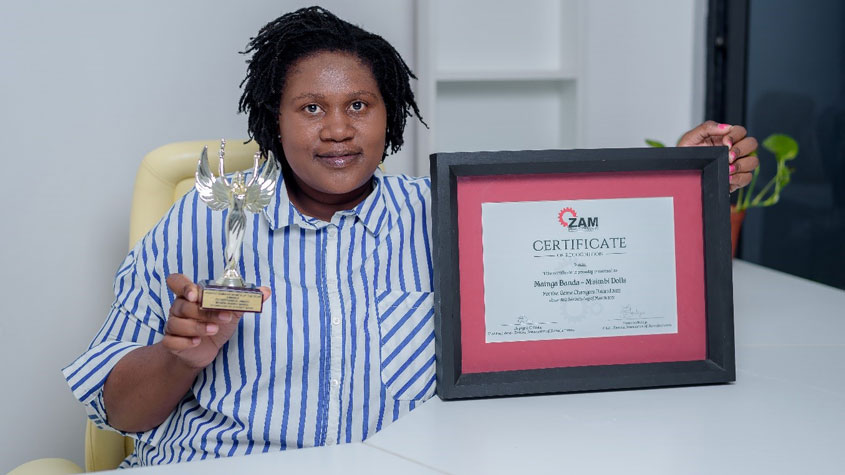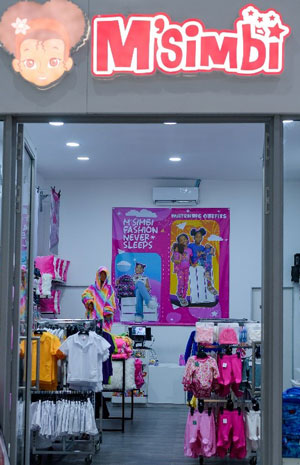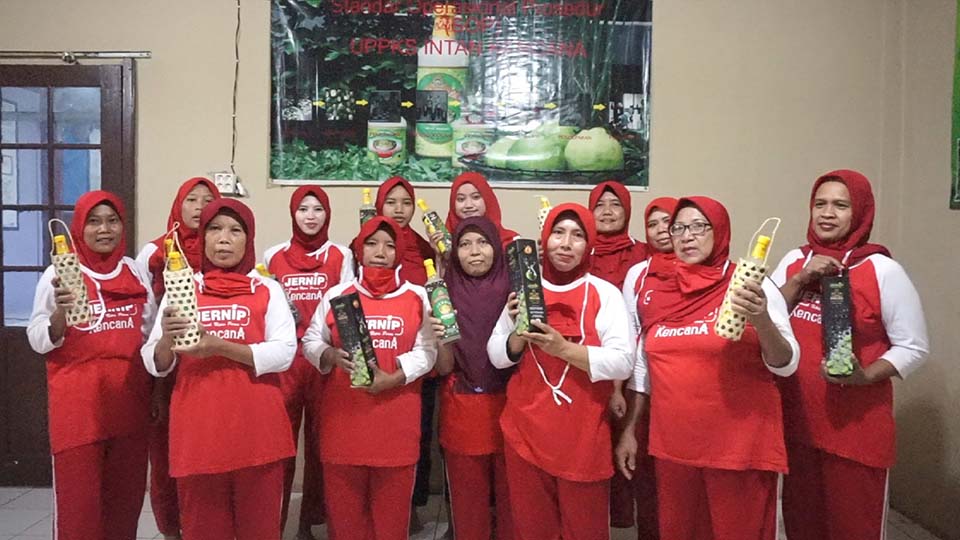Starting out as a 'social enterprise' to foster self-confidence in pre-teen girls, Zambian lifestyle brand "M’Simbi" has won over the British and US markets, after securing trademark protection through WIPO's Madrid System. Their hopeful message is bound to resonate with little girls from other African countries, where the company plans to expand next. This is just the beginning of M'Simbi's climb to success!

Under-represented beauty
Bio-statistician, Maingaila Moono, had always been passionate about helping children. While working for UNICEF in Nigeria in 2016, she noticed that her daughter, Lindiwe, was growing sad and increasingly dissatisfied with her appearance. The majority of her friends at school were Caucasian, and Lindiwe started thinking that having a lighter skin tone was more desirable.
“I wanted to teach her that the way she looked was beautiful and that she didn’t need to have straight, silky hair. But I actually didn’t know how to”, Maingaila told us.
Then, an idea sprang to mind. What her daughter needed was to see different representations of beauty from those that the school and the media exposed her to every day. So, she thought about buying Lindiwe a Black doll. After searching for several days, Maingaila was quite surprised to discover that not a single doll on the Nigerian market looked like her daughter. It was no wonder that her girl felt uncomfortable and out of place.
Maingaila went the extra mile for her daughter and decided that if they were not available, she would have to find a way to make Black dolls herself. She sent a photo of Lindiwe to a manufacturer so that they could make a doll based on her facial features and, the first M’Simbi doll was born!
Down to business
The result was incredible, and the parents of friends and neighbors started asking Maingaila for Black dolls for their daughters. She immediately sold all ten dolls ordered in a first batch. Maingaila realized that many children in her community needed to feel represented, and that there was a huge demand for this product.

The following year, she and her daughter returned to their home country, and noticed that there was a similar gap in the Zambian toy market.
Maingaila decided it was time to set up a small family business and launch a doll brand. The Kids Festival in Lusaka seemed like the perfect occasion. Having spread the word on M’Simbi's new Facebook page, customers swarmed to her booth. Maingaila sold 200 dolls that day – proof that her idea had the potential to become a successful enterprise!
Before further investing in this project, Maingaila protected her trademark nationally through Zambia's Patents and Companies Registration Agency (PACRA). By July 2017, she had a national trademark registration.
M'Simbi mania breaks out

M'Simbi’s first store opened in 2018. Maingaila wanted control over her branding and retail operations, but she soon realized that offering one product was not enough. M'Simbi had the potential to be so much more than just a doll seller; it could be a lifestyle!
M’Simbi means 'girl' in a lot of Zambian languages, so we thought it was something our target audience could resonate with. The brand is all about teaching girls self-love and pride for their cultural identity.
Maingaila Moono, M’Simbi
The brand – which stands for self-love and acceptance – was defying traditional beauty standards in Zambia with joy and positivity. Girls wanted to show off M’Simbi’s logo because they felt part of a community with shared values. Customers started asking for products their daughters could actually wear and carry with them, such as school backpacks (the most profitable product in their catalog), clothes, and underwear.
Growth and resilience

By 2021, the company had opened five retail stores in Zambia, added new brands to its portfolio, and hired more employees.
When the COVID-19 pandemic hit businesses all over the world, M’Simbi was no exception. They manufactured and imported the majority of their products from China but, due to the pandemic, the supply chain simply broke down.
Maingaila started thinking: “What if we make some of these products ourselves?”
She started by buying three sewing machines and – since she did not have any background in clothes production – hiring her own tailors.
Today, M’Simbi has absorbed half of its manufacturing operations and plans to move to a new facility within the next few months.
“M’Simbi” – international registration No. 1576879
It was not long before word about M’Simbi spread beyond African borders. Demand for their dolls was growing steadily in the United Kingdom and in the United States of America, where there are large Black communities.
But, Maingaila came up against many obstacles when she tried to sell her products to customers overseas. Shipping was expensive and local export companies were unreliable. Major e-commerce platforms did not even accept sellers from Zambia at the time. It was a journey riddled with disappointment.
The only way M’Simbi could export its products to foreign markets through global e-commerce platforms was by registering its trademark in those countries. Maingaila was also aware that protecting her trademark abroad would be the wisest choice to avoid misuse of her logo and brand name in target markets. So, the entrepreneur decided to go back to PACRA to ask how she could protect her trademark internationally.
That’s when she discovered WIPO's Madrid System. “PACRA really helped us. Otherwise, we would never have known about the Madrid System and how important it is”.
At the end of 2020 – without the need to use a legal representative – she filed her international application to seek protection of her trademark M’Simbi through the Madrid System.
Maingaila wanted to use the Madrid System to protect her trademark in China, the United Kingdom and the United States of America. To do so, she just had to do designate these three countries in her one international application! The United Kingdom and the United States of America were an obvious choice – there was high demand for her products in those countries – and it only made sense to designate China as well, where M’Simbi's manufacture facilities were located, and from where she imported fabric for backpacks and clothes.
Coming back from setbacks
One day, Maingaila received a provisional refusal letter from the US Patent and Trademark Office (USPTO). Her focal point at PACRA explained to her that if she did not comply with the requirements stated in the letter, the USPTO would drop her request for trademark protection, resulting in a waste of money and time for her.
The main issue with her application was that the categories of goods and services listed were too broad and vague.
Not sure which classes your products belong to? The Goods & Services Manager available under eMadrid will help you out. Simply search for relevant keywords to get a list of appropriate product classes, to create an accurate list of goods and services.
The USPTO also requires trademark holders to appoint a US-based attorney. Without any charge for their assistance, PACRA helped Maingaila find a lawyer to whom she provided a more specific description of her goods and services. The USPTO granted “M’Simbi” trademark protection in 2021.
Future projects
Maingaila is planning to expand protection of her trademark to other African countries where demand for M’Simbi products is high, namely Malawi and Zimbabwe. Now that she knows about eMadrid, she will easily be able to do this online.
In the months to come, Maingaila will also use the Madrid System to apply for trademark protection for the other two brands in M’Simbi’s portfolio: Kicks & Krawls – tailored for babies – and Pikiny, dedicated to boys. She will be able to easily manage all her international trademark registrations centrally through eMadrid.
The brand is also planning to expand to new product categories, like hair accessories, which are very popular in Africa.
As her business grows, M’Simbi’s social mission becomes more ambitious. With the opening of a new manufacturing facility just around the corner, Maingaila believes that the company will significantly contribute to the local economy, employing many new workers.
And, M’Simbi’s educational effort does not stop with promoting different beauty standards through dolls! To enhance its sense of community further, Maingalia plans to open a club. M’Simbi stores will hold small workshops where young customers can discuss self-love, confidence and the challenges that come with puberty. The launch of a period kit and a book that teaches pre-teen girls about menstrual hygiene are also in the works.
Maingaila thinks that there is still more to be done to raise awareness about the Madrid System among small entrepreneurs in her home country.
Like many female start-up founders, I am part of the Zambian Association of Manufacturers, and they seldom cover this topic, but I would like to suggest it. The Madrid System can actually help many Zambian businesses. I would definitely encourage local entrepreneurs to apply for trademark protection both locally and internationally. When PACRA told us that you can register your trademark in many countries at once with the Madrid System, it really intrigued us.
Maingaila Moono, M’Simbi
You can find out more about M’Simbi’s International Registration No. 1576879 in Madrid Monitor available under eMadrid.
More about the Madrid System
The Madrid System is a convenient and cost-effective solution for registering trademarks in up to 130 countries by filing one application and paying one set of fees.



